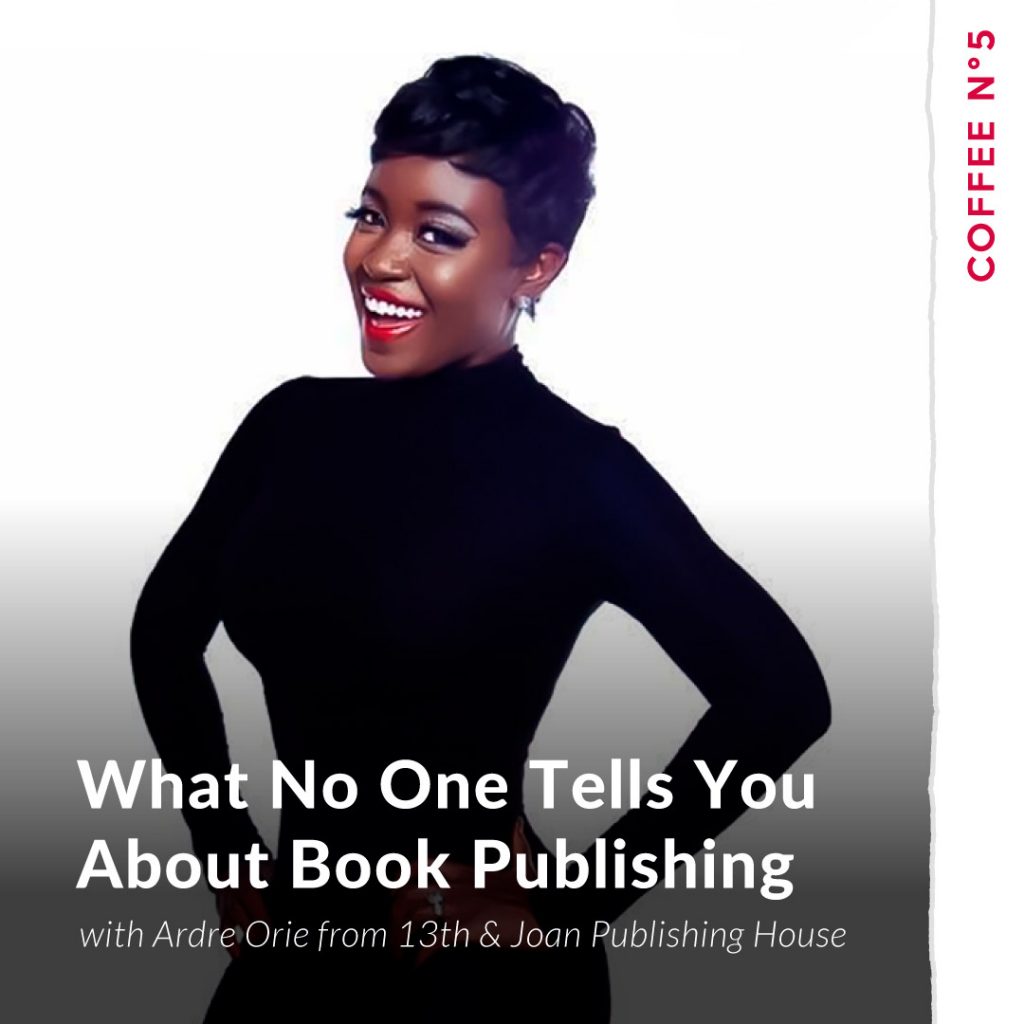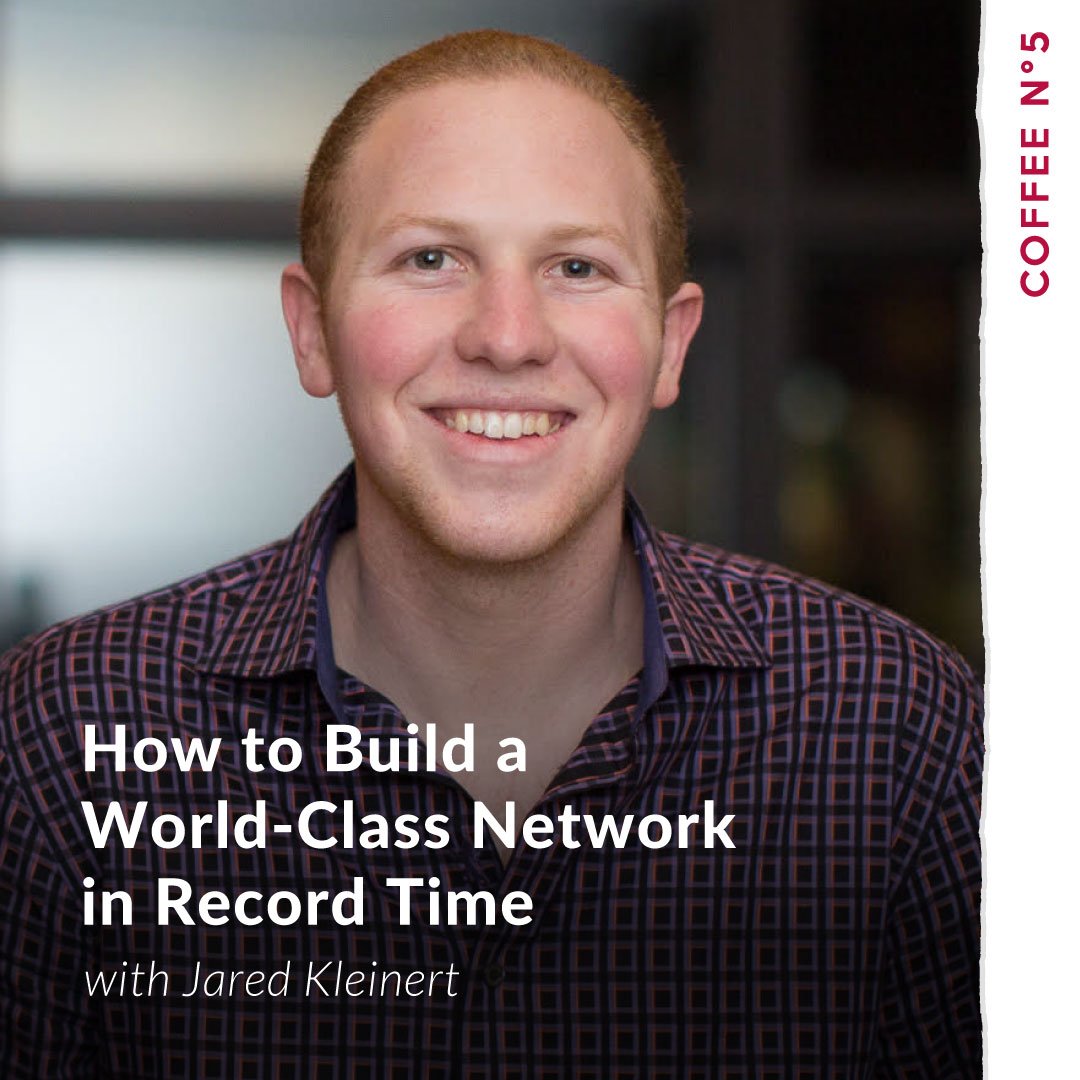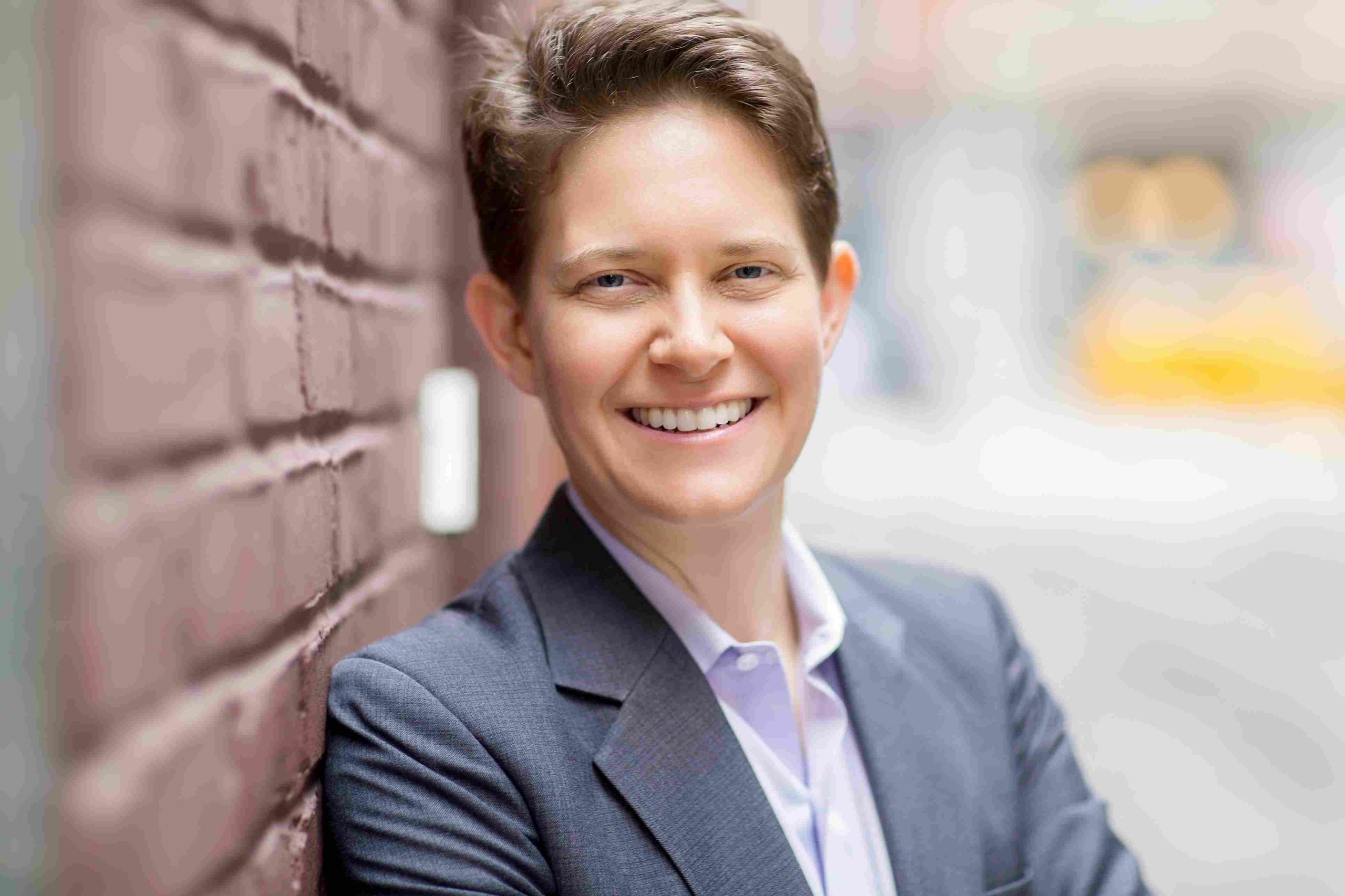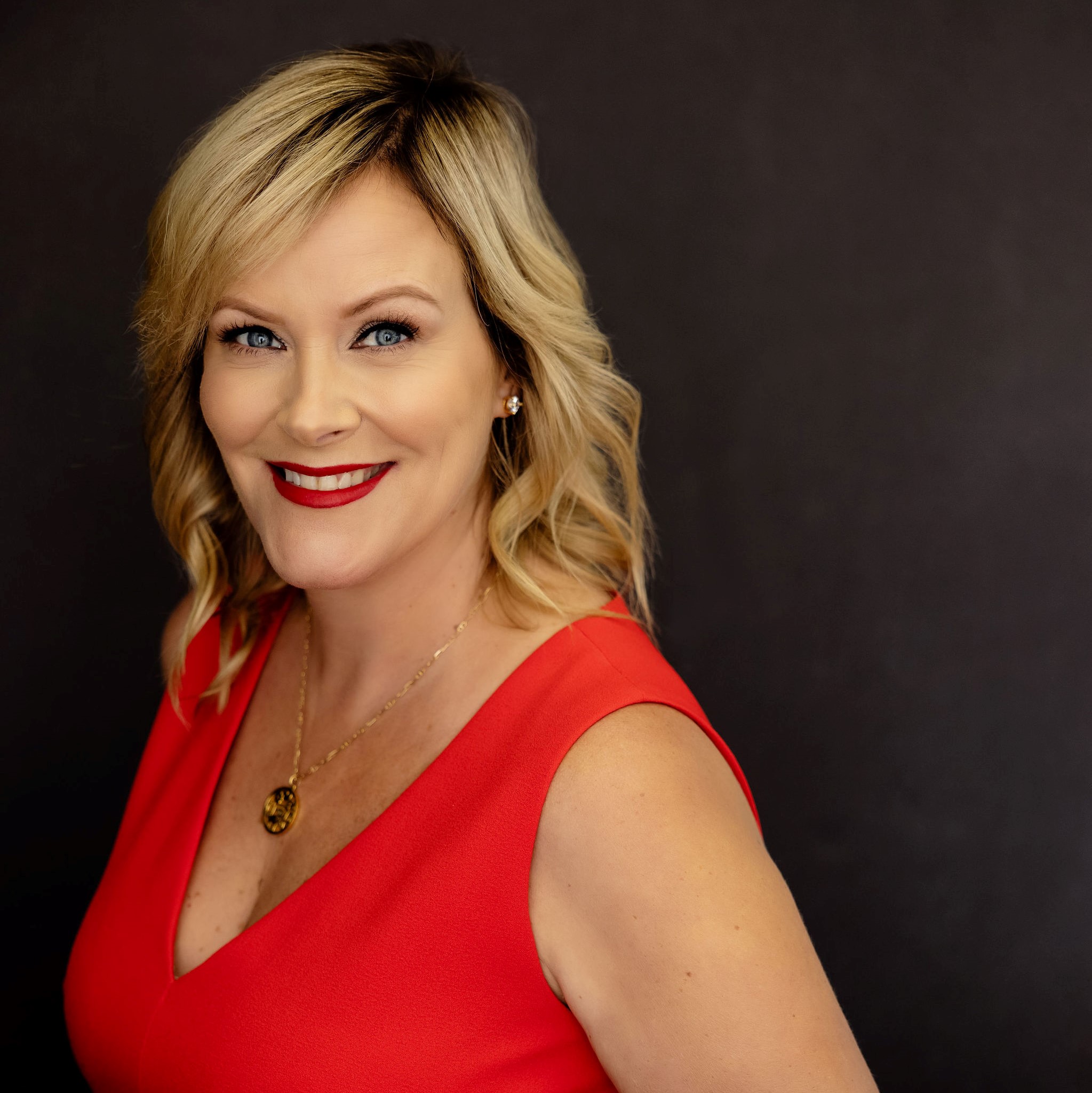What No One Tells You About Book Publishing With Ardre Orie from 13th & Joan Publishing House
SPEAKERS
Ardre Orie, Lara Schmoisman
Lara Schmoisman
This is Coffee N. 5, I’m your host, Lara Schmoisman. Hi, everyone. And welcome back to Coffee N. 5, I have to tell your story, I will, first of all that you have to write a book, you have to plant a tree, and you have to have a child, I planted a tree, I had a child, and I need to go for the book. And since I’m a crazy reader, and it’s something that I always love to do, and then I had to learn a second language to be able to breathe in the language. And, and I’m grateful for the written words, because it gave me vocabulary. And it gave me experiences of other people. And it took me to different worlds. And I level that, and today we’ve brought Ardre Orie, who is the CEO of 13th & Joan. So you’re gonna have to tell us about that name, why, but also, I, she is gost, a former gost writer. And well, she has an incredible story that she’s going to share with us, I hope. So welcome, Ardre.
Ardre Orie
Yes, thank you so much for having me. First and foremost, I really appreciate the opportunity to share. So as you mentioned, my name is Ardre Orie, and I am a celebrity ghost writer and CEO of 13th & Joan Publishing House. 13th & Joan , the name came from, actually, I was raised in a single parent home. And so I was raised by my mother, and my grandmother who lived about four hours away. And so my grandmother was born on the 13th day of October. And my mother’s name is Joanne or Joan. And so I always say that my story is the intersection of those two women who raised me. And so that’s how I came up with 13th & Joan
Lara Schmoisman
Oh, my God. And you can tell that the writer came up with that name, because it’s very, very unique. And I love you. So tell me a bit more about your story how this this journey started from the coming from a single mother house and and growing into writing on it, you wrote pretty for private people, and you do a lot of stuff.
Ardre Orie
So one of those things, you know, that you asked is how was it growing up in a single parent home. So my father was not there not present. And for quite some time, I didn’t really feel that it affected me in any way I thought, you know, my mother did a phenomenal job. It wasn’t until I was older that I kind of realized the importance of what a father can give to a daughter. And that some of those things may have been things that I needed to that I didn’t have, you know, honestly. And so the other thing that I recognized in some ways is that it affected my self esteem, I didn’t know that at the time. But as you get older, you start to kind of analyze things, you realize where some of that pain can be. So there was that. And then also, one of the things that did happen was that there was my mother eventually found love. And then there was domestic violence in my home. And so that was something that I witnessed. And so you know, together, my mom and I really teamed up. And the domestic violence laws at that time were very lenient, nothing like what is in place today. So you know, we teamed up to kind of try to strategize our way through it, to get past that, and we did together. And so we ended up really being successful as far as you know, her moving forward and me moving forward in school. But that was the you know, the the trauma. And so as I got older, I realized that, wow, these are some things that I haven’t actually dealt with. And these are some things that are shaping who I am and who I become, they’re part of my story,
Lara Schmoisman
but also that they made me a stronger
Ardre Orie
definitely made me stronger, definitely made me stronger. But the one thing that I did at the age of 10 was that I wrote a book, I wrote a book, I published the book, I planned a book signing, and I actually interviewed women to share their stories in that book. And so I was able to touch writing, I was able to touch words, I was able to touch stories at the age of 10. And that never left me and so what I didn’t realize at the time was that that was ghost writing, running the you know, the publishing house, creating book signings, helping people with their book launches. That’s what I do today. So it’s really a full circle moment to come back to books and words.
Lara Schmoisman
So you’ve been doing this for how long now? I mean, I don’t want to give away your age, but
Ardre Orie
it’s fine. It’s fine. Yeah, I’ve been writing now for 35 years.
Lara Schmoisman
That’s incredible. There are so many people that are picky about grammar, grammar, and I’m one of those, but I mean, they’re also still feel like grammar has changed in the last time. So I feel that they did because of social media and because how we use the language.
Ardre Orie
Absolutely, grammar has evolved, it’s continued, you know, it continuously evolves. And we have to stay abreast of you know, what is considered acceptable. But the other thing that grammar never took into account is that people come from various backgrounds, and we speak various languages. And then even within our cultures, we have languages that are not necessarily common knowledge. And so you have to account for that, you know, when it when grammar comes into play, one of the things that we really value at 13th & Joan is making sure that we have editors who are culturally aware of the stories that are being told there are some things that should remain the same, depending on who the reader is, there are some things that should be changed. And so we definitely honor the grammar police. But we also honor the cultural nuances and the ebbs and flows of the unspoken rules that apply to specific cultures in specific nationalities.
Lara Schmoisman
Yeah, and I, I so respect that. But I want to ask you, because I hear so many people say I want to write a book, I’m writing a book, and they never end. And I’m one of those but not because I don’t want to finish it. I don’t want to finish this, I just never have the time. And it will happen eventually. But okay, so let’s give up the steps because I always talked to people in the other side that are writers, and they get the book, let’s talk from the publisher side, what makes you publishable?
Ardre Orie
You know, the first thing because the the first consideration is that in many instances, we serve audiences that might not be selected by the major publishing houses. And that has nothing to do with the quality of the story. One of the things that I did when I got involved in publishing is that I started to do research. And I realized that there was a great disparity between who was selected by major publishing houses, and there were five there condensing now. And there are going to be some, some mergers coming up that are very big, that will affect the publishing industry as well. But there were people who were overlooked. And I was really concerned about that, because I know that there are very valuable stories out there that need to see the light of day, there are stories that are blueprints, for people who come behind those information that needs to be shared. And so I wanted to make sure that there was an alleyway, you know, for people to publish quality work. The second thing that we have to take in consideration is that the industry, the publishing industry is changing, it’s ever evolving. And so because of those mergers that are happening right now, as we speak, the mergers are so big that there are people who petitioned the mergers to happen because they understand the effects on the publishing industry. But what that means is that there is less opportunity from the big publishers that have been in existence for over 99 years for new authors, first time authors. But what I recognize as a publisher is that because you’re a first time author, it doesn’t mean that your stories have any less value, it doesn’t mean that it’s of any less importance. So I say all of that to say what we’re looking for first and foremost, is an author who is passionate about getting their story to market. Because
Lara Schmoisman
Let me ask you a question. Because I want to make sure our audience understand what a publisher does for an author. Because I think that there is a misconception about publishers. And I just want to clarify the role of the publisher and their relationship with the author.
Ardre Orie
Sure. Now, all publishers are not created equally. That means that, you know, publishers serve different purposes, every publisher doesn’t do the same thing. However, the things that a publisher can do is to help the author with the concept of the book that is conceptualizing what the book will be written about what components are included in the book, what stories are what information is going to be a part of it. A publisher can also assist in the writing process. For example, I’m a ghostwriter. So sometimes I write the book for a client. a publisher can assist in developing the cover concept and making sure that the cover concept aligns properly with the story. Developing the inside of the book, the way the book looks inside is just as important as the content that is in So the readers experience the publisher can deal with that. The publisher can help the author to price the book to determine the appropriate market pricing to determine the genre for the book, that’s to determine the categories that the book would be listed in, when it is, you know, made life, the publisher can also do distribution. And so what that means is where is the book going to be sold? How is it going to get into the hands of the customer?
Lara Schmoisman
Okay, that’s something that I think is a biggest believe that a publisher, that’s the only thing that they do is distribution. So you can have a deal with a publisher without distribution?
Ardre Orie
Well, it depends on what kind of deal you have with the publisher, there is what is called vanity publishing. And those publishers will often create the book for you, and then you can publish it yourself. And then there are publishing houses who are not vanity publishers, and they take care of the distribution. So that’s why I’m saying it’s not a one size fits all, all publishers are not created equally.
Lara Schmoisman
So for example, if let’s say I have a book, and I wanted to work with you, so I’ll send you my manuscript, what would you do next?
Ardre Orie
So and I hate to say it depends, but it depends if the manuscripts if you’re coming to us with your manuscripts, we would analyze its content, we would determine its viability for market. And then we would also determine your viability T for market. So are you also willing, you know, to promote your book and to build your author’s platform that’s very, very important. And absolutely, the author has a say so in all of these things, but the publisher is there to consult and to guide and to make the decisions that are in alignment with what’s going to help the book to be successful. So from the point of the consulting, the book goes to editing, the book gets developed design process, all of those things. And then distribution is the the last step of the publishing process.
Lara Schmoisman
And why would you destroy a distributor at your work, we have already worked with channels or bookstores, online, how you determine that?
Ardre Orie
So you put together what’s called a distribution strategy. That is also not a one size fits all, because all authors don’t have the same goals. There are some authors who do not want your book to be listed on Amazon, because of the compensation that Amazon takes. Some authors have built like for an example, there is an author that we have who has followers in excess of millions. So they don’t need Amazon as a platform for their book to get readers. If that makes sense. They can keep more of their profits. But on the other hand, there are people everyday heroes, as I refer to them who benefit from the traffic that Amazon or Barnes and Noble online offers. And so when you create a distribution strategy, you have to make that determination based on what the author needs as well as the author’s brand. So what your brand can sustain is also just as important, that means that it could be independent bookstores, it could be we’ve, you know, books, places like Target and Walmart, those are non traditional places for distribution for authors. And so again, not a one size fits all.
Lara Schmoisman
Yeah, absolutely. How normally the publisher works with the client, you take a commission, you take a flat fee, how do they work,
Ardre Orie
all kinds of deals, not a one size fits all, you know, there are all kinds of deals, and we have, you know, various authors who there is a fee based service, right? And then we have you have authors who there may be a larger commission that is taken off the sale of the books. And so you really have to
Lara Schmoisman
what is a normal commission from a publisher?
Ardre Orie
So when you talk big house, big publishers, the ones who have been in existence for 99 years, you can see an 80-20 you can see a 70-30 and that is not in favor of the author.
Lara Schmoisman
And if you go, because I want to try to explain because so many people want to go with the big house publishers. So why some people should go with a smaller house publishers and big cars, what are the benefits that you’re saying?
Ardre Orie
Right. So one of the things that people need to understand with a big house publishers is that you do not in most instances, own the copyrights to your book. And so you know, we always think about Wow, I want to I want to be sign you know, by a big publisher. Well, that comes with big responsibility. If you want to keep your copyrights, chances are you’re going to want to go with an independent publisher or to you know, find another avenue because the copyrights are important to you. Most of the time when you go with a bigger publisher, they will own the rights to that story and they will make the majority of the money because they are going to an old days they used to put their marketing machine behind it. People need to understand that that is dwindling that That particular model is a model that is is dwindling very fast because the marketing budgets are not really a lot it to first time authors or smaller authors without larger followings. The reason why is because the publisher cannot guarantee book sales. If you’re a JK Rowling and you’ve already sold millions of copies of books, then the publisher is likely to take a risk, because they understand that the reward is guaranteed, if that makes sense.
Lara Schmoisman
Yeah. So in this case, for example, would you give the client a budget for the writer budget for advertising or something that a writer needs to do themselves?
Ardre Orie
what the writer must understand is that any money’s given from the publisher will always be borrowed against sales. So if you are given a marketing budget, you’re still going to pay for it in your book sales, that money, people think, Okay, well, I’m getting in advance, that advance is borrowed against your book sales. And so that is why you have people that often don’t see money back from their books, because it is borrowed against book sales. It’s like that in every industry.
Lara Schmoisman
I mean, I think that’s what’s so great that you explain it, because that’s, I think, something that they always say, Oh, I got an advance about so much from marketing, but we never say that, okay, you’re not gonna get that you’re not gonna see money for you for a long time, because you need to pay back. It’s like a mortgage.
Ardre Orie
Exactly. And most of the time, your royalties, does not kick in until after those monies have been satisfied. So when you see someone that says, oh, wow, I’ve got this big, you know, press release, a press press media run, or, you know, there’s some huge push behind it that is borrowed against the sales.
Lara Schmoisman
Let me ask you something else. So what would you recommend to new writers to pay for their own marketing? How would you recommend it to do it?
Ardre Orie
I recommend for new authors, you know, number one, to build your brand. The thing is, you know, when you think about music, the reason why artists don’t necessarily need to be signed by labels anymore is because you have the power to immobilize people on your own. You know, when you think about the the example that I can give is a terrible example. But Justin Bieber, remember, he was a sensation on…
Lara Schmoisman
Yeah, I remember that I remember that was just gave up, we just gave away our age almost
Ardre Orie
we gave away our age, Justin Bieber, Lord, use it today. But you know, he was really popular, and he built his fan base on his own. And so he became of more value to a label for that reason, he did sign up a recording contract, I believe, but he was a value. And the same thing is happening with many artists. And so I recommend to writers in all phases that you build your brand, because you have more leverage. When you have an established brand you have more leverage for publishing houses right now. You’re they’re not looking for books, they’re looking for authors who can sell books, if that makes sense.
Lara Schmoisman
Exactly. And I always say this to all my clients. Even I said, when I hire someone in my team, what their added value? How are you different what you can bring to the table to help my team? Or what can you bring to the table to help your customer that you’re different to someone else? What’s your added value? And the same happens with a book? How are you different? How are you unique?
Ardre Orie
And the only thing you know, I mean, when we think about concepts, there are no new concepts, you know, they may be things that we write about differently, but the thing that makes an author unique is them, you know, being an individual, of course. So that’s where the value add is your experiences, the things that you have gone through, you know, the lens that you see the world through, that’s what’s going to make you different. And so those are the very things that we use to leverage success.
Lara Schmoisman
I love that we’re so aligned in how you work with your authors and I work with my team and my clients. I love it. Well, I want to thank you so so much for being here. today. We’re gonna put all the information in the chapter notes so anyone can contact you 13th & Joan, they can get all the information for me. Oh, and they can even teach you a story maybe?
Ardre Orie
Absolutely. We’re always looking.
Lara Schmoisman
Thank you so much for this valuable information. Thank you.
Ardre Orie
Thank you.
Lara Schmoisman
Thank you for joining us. If you like the show, remember to leave a review. I will really appreciate it. If you want to know more about marketing and and myself, follow me on Instagram. My handle is Lara Schmoisman. Was so good to have you here today. See you next time. catch you on the flip side. Ciao ciao








